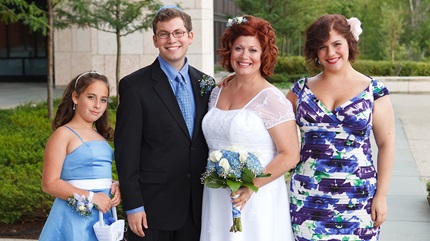Overview
Cleveland Clinic's Voice Center includes recognized experts from Laryngology and Speech-Language Pathology who uniquely focus on the professional voice user, representing a dedicated center of excellence to uniquely serve the voice disordered population, with special focus on the professional voice user. It offers a team approach to evaluating and treating problems related to the human voice and the physical structures that produce it. These structures include the mouth, nose, throat, and voice box.
Otolaryngology (ear, nose and throat) specialists, speech pathologists and voice teachers provide primary services, in conjunction with several other medical disciplines to treat disorders such as voice box or larynx cancer. Related problems may require the assistance of experts from neurology, gastroenterology, endocrinology, allergy, pulmonary medicine and clinical psychology/psychiatry.
Symptoms of a voice problem include such things as hoarseness, whisper, roughness, discomfort to talk or sing, loss of singing control and effort/strain. They are potentially serious and their cause cannot be determined simply by the way they sound. These disorders could be something relatively mundane or could be as serious as voice box cancer. Therefore, a person experiencing difficulty should be evaluated promptly by voice disorder specialists.
The Voice Center staff perform a physical exam and specialized tests to determine the nature and extent of the problem. A special slow motion video picture of the voice box often provides the explanation of the problem.
Most voice problems are managed successfully without surgery, through behavioral change and medical care. If surgery is necessary, specialized techniques that reduce tissue harm and promote faster healing are available through our trained surgeons.
LGBTQ+ Care
The Voice Center at Cleveland Clinic’s Head & Neck Institute offers comprehensive gender-affirming care for adults that includes both surgical and therapeutic options for patients seeking to align gender expression and identity. For patients seeking voice feminization, specialized voice and communication training provides treatment to address vocal pitch, resonance, inflection, speech rate, vocal tract shaping, word choice, etc.
Many patients can achieve their goals without surgery. Voice therapy/voice and communication training is provided by voice-specialized speech pathologists in the Head & Neck Institute. Surgery can also be a component of care and involves procedures to help elevate pitch. We have found that both approaches—surgery and therapy, or a combination of the two— have similar outcomes. With this in mind, treatment is more driven by what approach the patient wants. We welcome all adult patients to The Voice Center, especially those in the LGBTQ+ community.
What We Treat
- Aging Voice.
- Airway Reconstruction.
- Airway Stenosis Treatment.
- Aphonia.
- Care of Professional Voice.
- Change in Voice.
- Choking on Food.
- Contusions on Vocal Cord.
- Coughing Up Blood.
- Coughing Up and Excess Phlegm.
- Decreased Projection.
- Difficulty Articulating.
- Difficulty with Vocal Range.
- Diseases of Vocal Cords.
- Dysphagia.
- Dysphonia.
- Effortful Singing or Talking.
- Epiglottic Growth.
- Exercise-Induced Laryngeal Obstruction.
- Fiberoptic or Flexible Laryngoscopy.
- Granulomatosis with Polyangiitis (gpa, Formerly Called Wegener's) of the Throat.
- Growth in Throat.
- Hoarseness.
- Immobile Vocal Folds.
- Infection in Throat.
- Knot on Side of Throat.
- Laryngeal Electromyography.
- Laryngeal Framework Surgery.
- Laryngeal Function Assessment.
- Laryngeal Stenosis.
- Laryngeal Tracheal Reconstruction.
- Laryngeal Videostroboscopy.
- Laryngitis.
- Laryngopharyngeal Reflux.
- Laryngoscopy.
- Larynx Cancer.
- Larynx Squamous Cell Carcinoma (SCC).
- Leak in Trach.
- Lesion in Throat.
- Loss of Voice.
- Muscle Tension Dysphonia.
- Nasally Sounding.
- Pain Vocal Cords.
- Painful Swallowing.
- Paralysis of Larynx.
- Pharyngitis.
- Polypoid Corditis Videostroboscopy.
- Problems with Vocal Cord.
- Professional Voice Care.
- Resonance Disorder.
- Sarcoidosis.
- Spasmodic Dysphonia.
- Speech Problems.
- Stenosis of Larynx and Trachea.
- Stroboscopy.
- Subglottic Stenosis.
- Swallowing Disorders.
- Swallowing Problems.
- Throat Problems - Constriction, Discomfort, Muscle Spasms and Obstruction.
- Throat Ulcer.
- Trach Management and Removal.
- Trach Removal.
- Tracheal Stenosis.
- Tracheostomy.
- Trouble Speaking.
Our Doctors
Looking for a voice disorders specialist?
Find a ProviderResources
World Voice Day
World Voice Day, celebrated annually on April 16, encourages men and women, young and old, to assess their vocal health and take action to improve or maintain good voice habits.
Your voice is an important part of your everyday life — in school, on the job, and during social interaction. But many people abuse their voice by smoking, shouting, drinking, or poor speaking technique.
When voice issues occur treatment is often ignored which can lead to more significant problems. To be aware of the demands put on your voice and the need for preventative care is a step in the right direction.
Voice Health Tips
1. Listen to the sound of your voice. Hoarseness can be an indication of something as simple as laryngitis or as serious as laryngeal cancer. If your hoarseness lasts more than a few weeks, particularly if you smoke or do not have cold-like symptoms, make an appointment with a voice specialist.
2. Quit smoking. Tobacco, nicotine, chemicals and inhaled heat can create inflammation and swelling and cause cancer in the mouth, nose, throat and lungs.
3. Drink alcohol and caffeine in moderation. Their dehydrating effects can cause strain on the vocal folds. To counteract it, drink one glass of water for each cup of coffee or alcoholic beverage.
4. Try not to scream, cheer loudly or talk over loud noise. Using your voice this way puts unnecessary strain on your vocal folds, can cause hoarseness and may result in vocal fold damage.
5. Manage acid reflux. Acids from the stomach can damage your throat. Signs of acid reflux include frequent heartburn, a bad taste in your mouth in the morning, frequent bloating or burping, a lump in the back of your throat, or getting hoarse frequently. Consult with a specialist to treat this problem.
6. Don’t force your voice when you are hoarse from laryngitis, a cold or the flu. When there is inflammation of the vocal folds, they are more prone to damage. Until you get better, avoid speaking loudly or for long periods, singing, or straining your voice.
7. Avoid frequent throat clearing or harsh coughing. Try sipping water or sucking on a cough drop instead.
8. Give your voice a rest. Be quiet for a while after talking too much or too loudly.
9. Drink plenty of water to help lubricate your vocal folds. Cleveland Clinic's Voice Center is a dedicated center of excellence to uniquely serve the voice disordered population, with special focus on the professional voice user. It is staffed by recognized experts from Speech Language Pathology and Laryngology.
10. Warm up your voice before teaching, giving speeches or singing. Do neck and shoulder stretches, glide from low to high tones on different vowel sounds, hum, do lip trills (like the engine of a motorboat) or tongue trills.
If you have hoarseness lasting longer than two weeks, it's time to consider scheduling an appointment for an evaluation by an ear, nose and throat specialist.
More Resources
- American Academy of Otolaryngology Head and Neck Surgery.
- American Speech-Language-Hearing Association.
- International Essential Tremor Foundation.
- Lee Silverman Voice Therapy (for voice problems related to Parkinson's Disease).
- National Spasmodic Dysphonia Association.
- Recurrent Respiratory Papillomatosis Foundation.
- Voice Foundation.
Support
Appointments & Locations
If you would like to be evaluated by an ear, nose and throat specialist at Cleveland Clinic's Voice Center, please call 216.445.8255 (TALK) or 800.223.2273, ext. 58255.
Locations
Voice Assessment
These are statements that many people have used to describe their voices and the effects of their voices on their lives.
Answer each one of these statements by selecting the response that indicates how frequently you have the same experience.
- My voice makes it difficult for people to hear me.
- Always
- Almost always
- Sometimes
- Almost never
- Never
- I run out of air when I talk.
- Always
- Almost always
- Sometimes
- Almost never
- Never
- People have difficulty understanding me in a noisy room.
- Always
- Almost always
- Sometimes
- Almost never
- Never
- The sound of my voice varies throughout the day.
- Always
- Almost always
- Sometimes
- Almost never
- Never
- My family has difficulty hearing me when I call them throughout the house.
- Always
- Almost always
- Sometimes
- Almost never
- Never
- I use the phone less often than I would like to.
- Always
- Almost always
- Sometimes
- Almost never
- Never
- I'm tense when talking to others because of my voice.
- Always
- Almost always
- Sometimes
- Almost never
- Never
- I tend to avoid groups of people because of my voice.
- Always
- Almost always
- Sometimes
- Almost never
- Never
- People seem irritated with my voice.
- Always
- Almost always
- Sometimes
- Almost never
- Never
- People ask, "What's wrong with your voice?"
- Always
- Almost always
- Sometimes
- Almost never
- Never
Scoring
- Step 1: Give yourself the following points on each question based on your answer:
- Always = 4 points
- Almost always = 3 points
- Sometimes = 2 points
- Almost never = 1 point
- Never = 0 points
- Step 2: Add up your points from each question for your final score.
- If your final score is between 0 to 3 points, you do not appear to have a voice-related concern.
- If your final score is between 4 to 6 points, you may have a voice problem. If it persists, consider being seen for an evaluation by your primary care doctor or an ear, nose and throat specialist.
- If your final score is greater than 7 points, you should consider being evaluated by an ear, nose and throat specialist.
Disclaimer: This information is for educational purposes only and should not be relied upon as a medical advice. It has not been designed to replace a physician’s independent judgment about the appropriateness or risks of a procedure for a given patient.
Frequently Asked Questions
Have you lost your voice? Cleveland Clinic's Voice Center helps people, including famous performers, get their voices back.
How can voice problems affect a person's life?
Voice is key to an individual’s self-concept and self-confidence. It’s the way we present ourselves to the listening world. When we have problems with our voice, our image in the world, our ability to carry on our professional requirements, and even our social and recreational activities are all affected. For example, if you’re a sports fan, you need to be able to talk over a crowd, and if you’re into martial arts, you need to be able to yell.
So it's not just an issue for performers?
There are lots of non-entertainment, non-celebrity occupations that rely heavily on speaking, like teachers, preachers, telephone operators, telemarketers, salesmen, police dispatchers, and on and on. When they get into voice trouble, all of a sudden they’re caught in a world that they don’t understand. It’s frightening and disorienting. That’s why they seek help.
Can you tell us about a celebrity who was treated at the Voice Clinic?
We treated Tom Hamilton, who completed his 33rd season of calling Cleveland baseball games on the radio in 2022. He’s in a very high-demand voice situation, and there are times that his voice has given him trouble. He has been very generous with his compliments about working with the voice team.
How about a case involving a non-performer?
We had a patient who had so much tension in her neck and voice box that she could hardly produce any voice at all. This isn’t as uncommon as you’d think: Some people carry their stress in the neck, which is the home of the voice box. In less than 10 minutes, using some tension-unloading techniques that are like massage or muscle manipulation in the neck and upper shoulder area, she regained her voice completely. The patient said that Dr. Claudio Milstein returned not just her voice, but her life. Check out our patient stories at the bottom of this page to see more examples.




